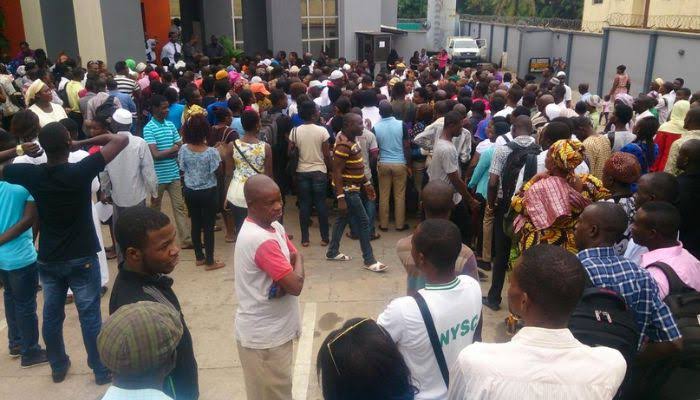
Governors of the 36 states of the federation have warned of impending recession following the damage the current scarcity of Naira notes is doing to the economy.
Accordingly, they urged President Muhammadu Buhari and the Central Bank of Nigeria (CBN) to listen to the voice of reason in respect of the suffering Nigerians are currently undergoing due to the new naira policy.
The Council of State had last Friday advised the CBN to print more naira notes or recirculate the old ones back to the system to ease the sufferings of Nigerians.
This was after the governors of Kogi, Kaduna, Zamfara and Kano States had dragged the federal government to Supreme Court, seeking invalidation of the deadline for the new naira policy which they said had caused untold hardship to their citizens.
Last week, Supreme Court ruled in favour of the governors, ordering the suspension of the February 10 deadline for the naira swap.
Rising from their meeting on Saturday, the governors under the aegis of the Nigeria Governors Forum (NGF) asked the federal government and CBN to reconsider their stands before the damage to the economy becomes too difficult to fix for the next administration.
They expressed sympathy and support for Nigerians who they said are experiencing great difficulties under the current CBN Naira re-design and cash withdrawal restrictions policy.
Chairman of the NGF and Sokoto State governor, Aminu Tambuwal, said they feel the pains of Nigerians and that they were determined to employ all legitimate channels to ease the situation.
According to him, it has become necessary to make a distinction between the CBN Naira redesign policy backed by Section 20 (3) of the CBN Act, 2007 and the aspirational policy of going cashless, both of which are mutually exclusive at this time.
He said it was the governors considered view that what the CBN is presently pursuing is a currency confiscation programme, not the currency exchange policy envisaged under S20(3) of the CBN Act, 2007.
Tambuwal stated that it is currency confiscation in the sense that the liquidity provided to the general public is grossly insufficient due to the restrictions placed on the amount that can be withdrawn regardless of the amount deposited.
He said, “The current approach of the CBN raises concerns about the respect for the civil liberties and rights of Nigerians as it relates to their freedom to use legitimately earned income as they so wish.
“The Forum believes that to deploy a cashless policy and deepen digital transactions, the best practice around the world is to create a suite of incentives to attract customers; rather than a draconian approach as we have witnessed in the last three months.
“The argument by the CBN for what it describes as the astronomical increase in the currency in circulation as the basis for this policy is not supported by its own data. According to the CBN, the currency in circulation increased from N1.4 trillion in 2015 to N3.23 trillion in October 2022.
“The bank appears not to have taken into consideration the increase in the size of the country’s nominal GDP over this period, the doubling of consumer prices, rising population, and the impact of the humongous Ways & Means advances to the federal government by the Central Bank of Nigeria over this period.
“In the circumstances, it is safe to draw either of two conclusions – the CBN data may be incomplete or in fact, Nigerians may have done exceptionally well in the transition to a cashless economy.
“In addition, considering the sizable informal sector in the nation, the amount of banknotes created in exchange so far by the CBN implies it vastly underestimated the economy’s actual cash needs.
“The inability to use the new notes has had far-reaching economic effects, leading to the emergence of the Naira black market, severe food inflation, variable commodities prices based on the method of exchange, and long queues as well as crowds around Automated Teller Machines (ATMs).
“And banking halls across the country with individuals hoping to get a fraction of their money in new notes to meet their daily livelihood. The country runs the risk of a CBN-induced recession.
“While we acknowledge the submission of the attorney-general of the federation that the federal government will comply with the ruling of the Supreme Court which calls for the halting of CBN’s plan to end the use of the old currency notes, we are yet to observe changes in the financial system.
“Consequently, we call on the federal government and the CBN to respect the Rule of Law and listen to the voice of reason expressed by Nigerians and several other stakeholders including the Council of State, before the damage to our economy becomes too great to fix by the next administration.
“Members rose from the meeting agreeing to direct their attorneys-general to review the suit at the Supreme Court with a view to consolidating the legal reliefs pursued by states”.

